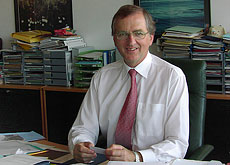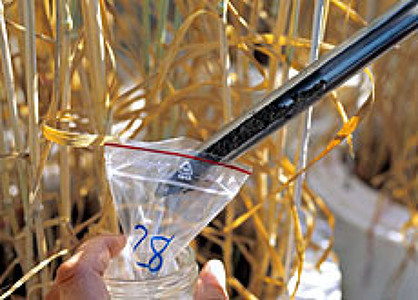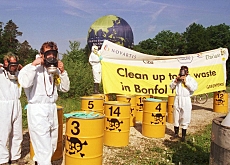Being green is good for business

The boss of the new Federal Environment Office tells swissinfo how proper management of natural resources also benefits the economy.
Bruno Oberle took over as director of the government’s environmental agency last October, after six years as deputy director under his predecessor, Philippe Roch.
Revamped at the beginning of January, the Federal Environment Office wants to improve quality of life and promote a healthy environment, and at the same time create a strong framework for economic development.
swissinfo: You have made it your objective to link together environmental and economic policy. But are there not too many conflicting interests involved?
Bruno Oberle: It depends on what you mean by the economy. For me, the economy does not mean just private business, but all of us: producers, consumers, workers and pensioners.
I do not believe there are any fundamental contradictions between the environment and economics. The aims of environmental policy are the sound management and lasting conservation of natural resources [and this is] one of the main factors of production and vital to a successful economy.
swissinfo: But environmental policy tends to pursue long-term objectives, while business is often preoccupied with the short term.
B.O.: Between environmental protection and some sectors of the economy there can obviously be areas of friction, but these need to be resolved through dialogue, and by compromise, in the country’s interests.
Think, for example, of the plan to introduce dust filters. Such measures can result in additional costs for some businesses but for society as a whole they save billions of francs in health costs and sickness benefit premiums.
The financial resources freed up in this way can then be directed towards increased consumption, encouraging economic growth.
swissinfo: Do you think Swiss business leaders are sensitive to environmental issues?
B.O.: Yes, especially the major companies which also operate abroad. They generally have more resources and therefore greater capacity to consider long-term issues. Resistance to environmental measures is more likely to come from firms which focus more on a local market and have greater problems in keeping production costs down.
Overall, however, Swiss companies have adjusted fairly quickly to the new environmental standards. Do not forget that the Swiss economy needs an environment that is properly looked after if it is to develop. This is particularly true of the tourist industry, but also applies to the people who work here.
Our economy is based on adding value and scientific research. It therefore needs a highly qualified workforce. And these people are generally very demanding when it comes to the quality of the environment that they and their families are prepared to live in. When they choose to work in Switzerland, they obviously do not expect to live on a rubbish heap.
swissinfo: But still the taxpayer is being asked to cover environmental costs amounting to SFr20 billion caused mainly by private businesses, which have contaminated land through the dumping of waste.
B.O.: Yes, these costs are unacceptable, not only from an environmental point of view but also in economic terms.
Polluters must pay; they cannot be allowed to off load the costs on to others. Otherwise you get a distortion of prices, and of the rules governing a market economy. Correctives must therefore be introduced.
swissinfo: In 1990, 70 per cent of people still regarded the environment as one of the main issues in Switzerland. Since then, this figure has gradually fallen, to just nine per cent in 2005. How do you explain this change?
B.O.: Basically, it can be interpreted as a compliment for the environmental policy enacted to date. Many of the problems that worried Swiss people ten or 20 years ago have been solved or alleviated.
Take the protection of water resources: nowadays you can bathe anywhere, whereas 40 years ago it was wiser not to put so much as a toe in many lakes and rivers. Once there were rubbish dumps in every part of the country; now waste is recycled and disposed of using modern techniques. Enormous progress has also been made in improving air quality and reducing acid rain.
However, this does not mean the environment is no longer a matter of interest and concern. If you ask people “what will be the major problems facing future generations?”, the most common answer is still the environment – ahead of unemployment and other social issues.
swissinfo: And what environmental problems will future generations have to face?
B.O.: One of the most serious will undoubtedly be climate change caused by human activity, which is likely to trigger a whole series of natural disasters.
The regions most vulnerable to such change are islands and coastal areas, which could be submerged. In the Arctic temperatures are rising rapidly. The third most sensitive environment is mountain areas. Switzerland must therefore anticipate very serious consequences and should be powerfully motivated to persuade the international community to act quickly.
Then there are several big unknowns, such as nano-materials and genetic modification. Chemical substances are being introduced into our water in tiny quantities, which may cause genetic malformations and sexual changes in plants and animals – and possibly in human beings.
swissinfo, Armando Mombelli
Born in St Gallen in 1955, Bruno Oberle grew up in Locarno, in Italian-speaking canton Ticino.
He holds a doctorate in applied science from the Federal Institute of Technology in Zurich.
He became director of the Federal Environment Office in October 2005, after six years as deputy director.
Oberle is currently the only high-ranking civil servant in the federal administration whose mother tongue is Italian.
The new Federal Environment Office came into being on January 1, 2006, when the Swiss Agency for the Environment, Forests and Landscape merged with parts of the Federal Office for Water and Geology.
Its remit includes the conservation and sustainable use of natural resources, preventing damage to the environment, and protecting people from pollution and natural disasters.

In compliance with the JTI standards
More: SWI swissinfo.ch certified by the Journalism Trust Initiative





You can find an overview of ongoing debates with our journalists here. Please join us!
If you want to start a conversation about a topic raised in this article or want to report factual errors, email us at english@swissinfo.ch.